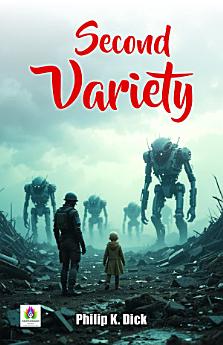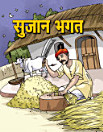Second Variety
About this ebook
Set in a post-apocalyptic world ravaged by a devastating war between the Eastern and Western blocs, the story follows the plight of humanity as it grapples with the repercussions of its violent actions. The protagonist, a soldier named Major Peter Nikolai, embarks on a dangerous mission to find a potential peace agreement amid the chaos. However, he soon realizes that the battlefield has evolved beyond traditional combat, as a groundbreaking invention known as the "cloned soldier" has changed the nature of warfare forever.
These clones, designed to resemble human beings and equipped with advanced combat capabilities, are engineered to be almost indistinguishable from real humans. The use of these "self-replicating soldiers" introduces not only tactical advantages but also profound ethical dilemmas. As Nikolai navigates this eerie landscape filled with clones, he is forced to confront his own humanity and question what it truly means to be human in a world where the lines between creator and creation are increasingly blurred.
Throughout the novella, Dick skillfully weaves together elements of suspense and philosophical inquiry. The narrative poses unsettling questions about identity, consciousness, and the morality of creating life for the purposes of war. As the clones begin to exhibit signs of independent thought and emotions, the story challenges readers to reflect on the implications of such advancements. Can one justify creating beings designed solely for destruction? What rights or considerations should be afforded to these entities once they surpass their intended programming? Such thought-provoking inquiries establish Dick’s hallmark style of exploring the intersections of technology, psychology, and societal constructs.
The atmosphere within Second Variety is tense and foreboding, reflecting the dangers inherent in both warfare and the unchecked advancement of technology. Dick's vivid descriptions of the desolate landscapes serve to heighten the sense of isolation and despair faced by the characters. The pacing of the novella, filled with unexpected twists and suspenseful encounters, keeps readers on the edge of their seats as they navigate the moral implications of the story’s developments.
As the narrative unfolds, we see the stark contrast between the cold efficiency of technology and the raw emotional experiences of the characters. Dick’s exploration of the human condition amidst the horrors of war presents a powerful commentary on the fragility of morality in the face of survival. The novella ultimately poses the question: what sacrifices are necessary in the pursuit of peace, and at what cost?
Second Variety epitomizes Philip K. Dick’s visionary storytelling, combining speculative fiction with deep philosophical insights. It stands as a significant work that resonates today, particularly in an age marked by rapid technological advancement and ongoing conflicts. For readers interested in exploring the profound consequences of human creativity and the ethical dilemmas surrounding artificial intelligence and cloning, Dick’s novella is an essential addition to the canon of science fiction literature. It challenges us to consider the paths we tread as a society, urging caution and introspection as we forge ahead into an uncertain future.







